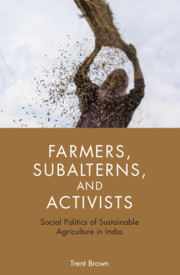Book contents
- Frontmatter
- Dedication
- Contents
- List of Images
- Acknowledgements
- 1 Introduction
- 2 India's Agrarian Crisis: A Gramscian View
- 3 Embedded in Power: Potentials and Constraints of Sustainable Agriculture
- 4 The Kheti Virasat Mission: People's Movement or Agrarian Populism?
- 5 The Tamil Nadu Organic Farmers’ Movement: The Limits of Participatory Approaches
- 6 The Beej Bachao Andolan: How ‘Grassroots’ is the Grassroots?
- 7 Conclusion
- Bibliography
- Index
3 - Embedded in Power: Potentials and Constraints of Sustainable Agriculture
Published online by Cambridge University Press: 08 July 2018
- Frontmatter
- Dedication
- Contents
- List of Images
- Acknowledgements
- 1 Introduction
- 2 India's Agrarian Crisis: A Gramscian View
- 3 Embedded in Power: Potentials and Constraints of Sustainable Agriculture
- 4 The Kheti Virasat Mission: People's Movement or Agrarian Populism?
- 5 The Tamil Nadu Organic Farmers’ Movement: The Limits of Participatory Approaches
- 6 The Beej Bachao Andolan: How ‘Grassroots’ is the Grassroots?
- 7 Conclusion
- Bibliography
- Index
Summary
In Chapter 2, I argued that the current situation in rural India may be described as a Gramscian ‘crisis of authority’. Consent for dominant ideologies is breaking down, which provides a political opportunity for subaltern groups to assert alternatives. Yet, as Gramsci is keen to emphasise, in the analysis of such a crisis, the balance of power between different groups is of crucial importance. Not all groups are equally positioned to develop consensus for a new hegemonic formation. Indeed, Gramsci (1971: 210) warns of the risk that:
The traditional ruling class, which has numerous trained cadres, changes men and programmes and, with greater speed than is achieved by the subordinate classes, reabsorbs the control that was slipping from its grasp.
The terrain of civil society, in which consent for new hegemonies is potentially established, is infused with power and privilege. If there is a ‘crisis of authority’ in the hegemonic approaches to agrarian development, powerful groups may be in a better position to respond to it. In a country such as India, the existence of multiple forms of inequality has a strong bearing on which groups are able to articulate alternatives to the current system and whose voices are heard. The voices of middle-class NGO workers with links to the development establishment often drown out those of others in civil society, which may ensure that hegemonic interests are not seriously questioned. Furthermore, at the local level, rural elites guide ongoing processes of change to ensure that they do not compromise their interests. Any attempt to formulate a sustainable and equitable response to India's agrarian crisis thus involves the navigation of a highly complex, uneven, and challenging terrain.
This chapter develops a conceptual framework to locate sustainable agriculture organisations within India's civil society, particularly attending to their position relative to various hegemonic forces. I begin by outlining the counter-hegemonic potentials latent within sustainable agriculture in the context of the present agrarian crisis. I then go on to outline the resource needs of sustainable agriculture organisations, highlighting that these needs often require external support. In contemporary India, this support is typically drawn from urban middle-class development workers. Not only have the urban middle class been historically significant in ‘articulating hegemony’ throughout India (Deshpande, 2003), but in the process of organising sustainable rural development projects, they become involved with various groups with vested interests.
- Type
- Chapter
- Information
- Farmers, Subalterns, and ActivistsSocial Politics of Sustainable Agriculture in India, pp. 55 - 79Publisher: Cambridge University PressPrint publication year: 2018



